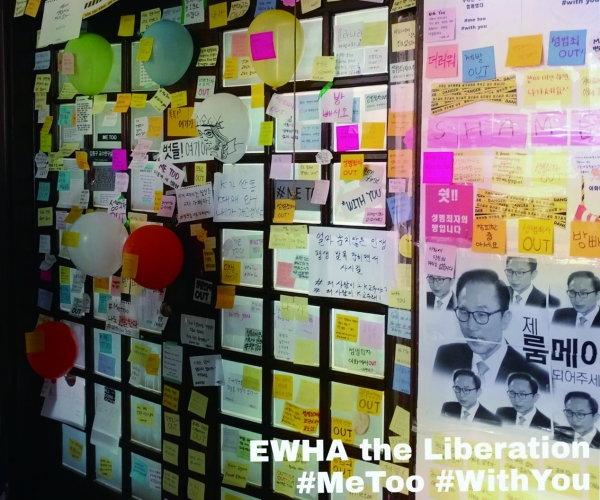
A Sculpture major professor dismissed due to sexual harassment may return to teaching. In April, the Appeal Commission for Educators (ACE) announced the revocation of disposition, meaning the disciplinary action for his charges has been nullified.
In March 2018, undergraduate and graduate students from the Sculpture major publicized the sexual harassment cases committed by Professor K. After the #MeToo movement within the Sculpture major brought attention to his actions, the graduates from the College of Art & Design formed the Ewha Sculpture Sexual Violence Emergency Response Committee to protect the victims and demand the truth be told regarding Professor K’s alleged crimes.
Ewha’s Sexual Harassment Commission received a formal request from the College of Art & Design to investigate the cases on March 20, 2018 and demanded Professor K’s removal for the accusations of sexual harassment between 2005 and 2017. Following the request, students and graduates of Ewha united to petition the disciplinary committee for his removal and show their support for the victims.
Instead of being removed, the professor was dismissed from the school by the decision of the disciplinary committee in July 2018. This means that Professor K has to stay away from teaching for three years whereas a removal would have restricted his reappointment for five years. Yet, the possibility of his reinstatement has been raised recently.
Even after the decision of the disciplinary committee, Professor K applied for a retrial on his dismissal to the ACE, claiming that the given disciplinary punishment was excessive. This request was rejected, after which he filed an administrative lawsuit regarding his dismissal in 2019.
The Ewha Sculpture Sexual Violence Emergency Response Committee and the 51st student governing body collected signatures from Ewha students and citizens to oppose the reversal of the disciplinary action made by the ACE.
Most recently, the Office of Faculty Affairs revealed in an interview with Ewha Voice that it had received a notice of revocation of Ewha’s disposition from the ACE in April 2022, and that relevant procedures are underway. The Office confirmed that the revocation was derived from the final ruling of the Supreme Court on the administrative lawsuit that Professor K filed against the ACE. The office refused to share any further information regarding the revocation due to confidentiality issues.
When asked if they knew anything regarding the reinstatement, the Ewha Sculpture Sexual Violence Emergency Response Committee replied they had not heard anything from the school but were paying close attention to the matter.
Under Article 66-4 Section 4 of the Private School Act, when the ACE decides to nullify or revoke disciplinary action, the disciplinary decision may be re-requested within three months after such a decision becomes final and conclusive. In other words, Ewha is bearing the burden of deciding disciplinary action again on the premise that the last one was unfair at the time.
Nearly four years have passed since the decision of Professor K’s dismissal, and there is currently no particular way to stop him from returning to his position.
A student at Ewha who was a freshman in 2018 expressed her shock at the current legislation which has imposed only a three-year restriction on a professor’s reappointment for conducting sexual harassment. She asserts that no one should be allowed to return to a professorship if it was confirmed that he committed sexual harassment on campus.
“Students who were victims of his misdeeds can still be at Ewha, either as undergraduates or graduates,” she said. “We can never rule out the possibility of secondary victimization.”
Likelihood of a recurrence of sexual harassment is another concern that the student has in this matter. She particularly emphasized the necessity of publicizing the professor’s reinstatement and his previous misdeeds for the good of students who will be taught by him as students who entered Ewha after 2018 may not know about the #MeToo movement, in which more than 2,800 students took part.
“It is horrendous to allow a person to resume his career as a professor when he has a criminal record from committing sexual violence with the authority he had,” she said. “In order to prevent him from returning to school in silence, we must constantly publicize what happened in 2018 in solidarity.”

